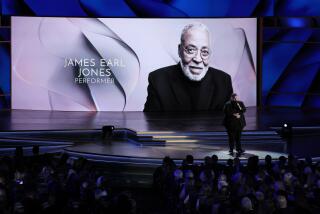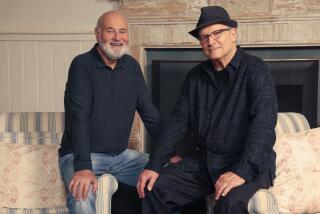Newhart is a master of the ordinary
- Share via
If it feels surprising to find comedian Bob Newhart the subject of tonight’s edition of the PBS arts series “American Masters” -- and it does, a little -- it says more about the persona he’s spent a career projecting than it does about the quality of his work.
Even on the several series that have borne his name, in every possible permutation (“The Bob Newhart Show,” twice; “Newhart” and “Bob”), he has contrived to be less than the dominant figure -- a reactor, a listener nonpareil, a harvester of silence. As comedian-director David Steinberg puts it in Kyra Thompson’s film “Bob Newhart: Unbuttoned,” “Bob is a regular guy -- he just happens to be a genius at being a regular guy.” Ordinariness has been his stock in trade -- not that of the everyman, exactly, but rather the extraordinary ordinariness of what Newhart himself describes as “the last sane man left in America.”
Newhart is especially easy to underrate because he never seems to be working hard, or working at all -- “underpowering,” costar and director Peter Bonerz calls him. As a stand-up comedian headlining a sitcom, he was not taken for an actor, which is to say, it was assumed he was merely “playing himself.” (That he was indeed an actor is asserted many times here, though it is also asserted that the person on-screen was an honest reflection of the person off.) Lacking the overt neediness of many comics and possessing no shtick wilder than his trademark stammer or crazier than a prop telephone, he was the still center around which everyone else revolved. He got laughs by playing the straight man -- “He would make a line funny by not spinning it,” observes David Hyde Pierce -- though, as this documentary demonstrates, he could also deliver a punch line, play drunk or walk into a door with the best of them.
That there is more to Newhart than has met the eye is shown through clips of the comic in both stand-up and sitcom mode, shaped by the commentary of friends, family and associates, including Suzanne Pleshette, Bill Daily, Marcia Wallace, Tom Poston and Julia Duffy from his two hit sitcoms (the two that were not hits are quickly glossed over), along with Buck Henry, Tommy Smothers, Larry Gelbart, Tim Conway, Don Rickles and Garry Shandling. Shandling, who displays his copy of “The Button-Down Mind of Bob Newhart,” the bestselling 1960 album that made the former accountant (who lived with his parents until age 30) a star almost overnight, sums up the Newhart effect: “The secret is they found Bob Newhart, who is an edgy guy underneath it all, and they put him in a softer format.”
His sitcoms were not formally ambitious, politically hot-button or expressive of current national obsessions or trends. They were character comedies, a little surreal around the edges -- as psychologist Robert Hartley, Newhart was surrounded by neurotics, and as innkeeper Dick Loudon, he dealt with the pixilated inhabitants of a rural small town whose roots go back to Capra and Sturges -- but in the Norman Lear-driven context of their time they were conservative. At the same time, says Shandling, Newhart was “revolutionary in some quiet, small way.” His series were adamantly adult, for one thing -- there were, on his insistence, no children around. (When writers prepared a pregnancy script, Newhart’s response to them was that he liked it, but “who are you going to get to play Bob?”) And “Newhart” ended with one of television’s truly astonishing moments, in which the entire series is suddenly transformed into a dream -- dreamed by the main character of his previous show. On the one hand, this is just a funny idea, delightful and disturbing; but it’s the sort of thing many credentialed toilers in the field of postmodern fiction would have given their tenure to have done.
It’s an engrossing and increasingly funny 90 minutes, though I must confess I am a particular sucker for hearing talented people discuss their work -- a reminder that although talent is inborn, accomplishment is not accidental. And this pleasure is further magnified by that of hearing other people who know something about the subject express their own informed views. It creates a kind of contagious excitement. “American Masters” specializes in artistic biographies -- personal details come into play, as necessary, but the work is refreshingly paramount -- with no prejudice as to popular versus high art. Obviously there’s a need to focus on performers who have been around long enough to be called “masters” -- no John Mayer here, not yet -- which means that many of its subjects are old or dead. Newhart is in his mid-70s but hardly retired. He plays concerts, makes movies and has a recurring role on “Desperate Housewives.” But there’s something good in this too: It encourages the young, if they can be torn away from their crazy rock videos and nutty computer games, to respect experience.
No mention is made of the “Hi, Bob” drinking game.
*
‘American Masters -- Bob Newhart: Unbuttoned’
Where: KCET
When: 8 tonight
Ratings: TV-PG-L (may be unsuitable for young children, with an advisory for coarse language)
Bob Newhart...Self
Executive producer of “American Masters” Susan Lacy. Writer, director and producer Kyra Thompson.
More to Read
The biggest entertainment stories
Get our big stories about Hollywood, film, television, music, arts, culture and more right in your inbox as soon as they publish.
You may occasionally receive promotional content from the Los Angeles Times.











